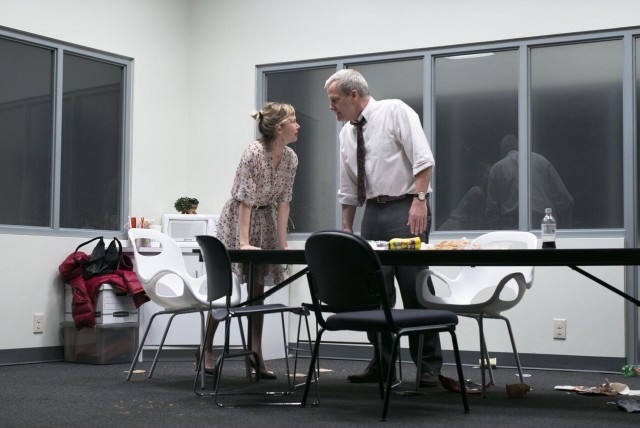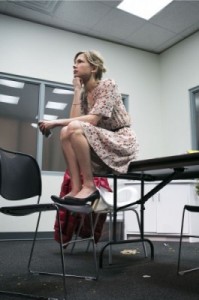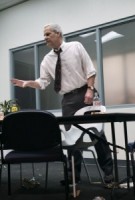
Una (Michelle Williams) and Ray (Jeff Daniels) revisit a past traumatic event in very different ways in BLACKBIRD (photo by Brigitte Lacombe)
Belasco Theatre
111 West 44th St. between Sixth & Seventh Aves.
Monday – Saturday through June 11, $39 – $145
blackbirdbroadway.com
In 2007, Jeff Daniels starred with Alison Pill in the off-Broadway premiere of David Harrower’s Olivier Award–winning play, Blackbird, directed by Joe Mantello at Manhattan Theatre Club. Nine years later, Daniels is revisiting the incendiary work by digging even deeper into his controversial character in the show’s must-see Broadway debut, running at the Belasco through June 11. Daniels plays Peter, a man suddenly forced to confront his past when Una (Michelle Williams) surprises him at his office late one afternoon. Fifteen years earlier, Peter, then forty years old and known by his given name, Ray, had an inappropriate and illegal relationship with Una, who was twelve at the time. “What cinched the decision to return was that Ray still terrified me,” Daniels wrote in a recent column in the New York Times. “Every actor knows you can’t run from the ones that scare you. It’s not the acting of the character, nor is it the dark imagination it takes to put yourself through all of his guilt, regret, and shame. To truly become someone else, you have to hear him in your head, thinking, justifying, defending, wanting, needing, desiring. The more I looked back at the first production, the more I saw what I hadn’t done, where I hadn’t gone. I’d pulled up short. Found ways around what was necessary. When it came time to truly become Ray, I’d protected myself. He’d hit bottom. I hadn’t.” Daniels indeed hits rock bottom in his remarkable, and terrifying, portrayal of Ray, humanizing a man who committed a horrible crime and tries to escape its consequences and get on with his life, changing his identity and moving away. But as Una, Williams is Daniels’s equal, fully inhabiting the difficult role of a young woman who, on the cusp of adolescence, had her future shut down by Ray’s actions. Tiny, wearing giant heels, and wrapped in a red puffer coat, Williams suggests both a fully adult woman and a sexualized child, delivering a character who never had opportunities to figure out who she is and potentially live a normal life. Their confrontation takes place in a small employee cafeteria in Ray’s office, where he at first denies even knowing who she is, although his head looks like it is about to explode. “This was pointless. Absolutely pointless. Can you see that?” Ray asks her, adding, “You’re a / some kind of ghost / turning up from nowhere to / Go home. / Please. / Leave me alone.” Una responds, “I do feel like a ghost. / I do. / I feel like a ghost. / Everywhere I go. . . . / You made me into a ghost.”

Una (Michelle Williams) considers where life has brought her in BLACKBIRD (photo by Brigitte Lacombe)
Williams and Daniels go at it in real time during the play’s ninety minutes, as details of past and present slowly emerge. Their words come in fits and starts, with incomplete sentences and several long monologues that are filled with emotion. While Una is often coy, Ray is angry, afraid not only of Una but of being discovered; as they play a vicious game of cat and mouse, switching between roles of attacker and prey, figures occasionally walk past in the hall or a colleague of Ray’s knocks on the door and asks for him. (These extras are seen only in silhouette through frosted doors and windows.) But even though we know in our hearts that what Ray did to Una was completely wrong, Daniels is able to elicit compassion for Ray, while Williams sometimes makes us feel like Una is taking advantage of the situation in unfair ways. I hated myself for thinking that, but that’s part of the beauty of Harrower’s (Knives in Hens) piercing dialogue and Mantello’s (The Humans, Other Desert Cities) astute, no holds-barred direction. “I am entitled to something. / To live,” Ray says. “I lost more than you ever did,” Una replies. “I lost / because I never had / had time to to to begin.” Scott Pask’s set is cold and unfeeling, almost antiseptic except for the mess of food wrappers and garbage left behind by employees. Trash becomes an integral part of the proceedings. Una tells a story about getting upset when she saw a man drop a can of beer and a cigarette on the sidewalk. “It’s not the litter / it wasn’t the litter / the dirtying,” she says. “It was the man, the person doing that. / Because he hasn’t been, been / schooled / educated / civilized enough / and I thought, / I just thought you are a beast.” She’s of course not talking only about the stranger but about Ray as well. But Ray refuses to see himself as a beast, and Una refuses to regard herself as garbage.

Ray (Jeff Daniels) tries to avoid a meltdown when part of his past comes rushing back in BLACKBIRD (photo by Brigitte Lacombe)
Watching Blackbird is as uneasy and uncomfortable as it is captivating and physically and mentally exhausting. I found myself leaning forward in my seat, mesmerized by every word and every nuance and movement by three-time Oscar nominee Williams (Cabaret, My Week with Marilyn) and Emmy, Drama Desk, and Obie winner Daniels (The Newsroom, The Squid and the Whale) as they worked their magic. They both give dynamic, unrelenting performances that are brave and bold. It’s more than just a battle of wits and power, or an argument about the nature of love, or an exploration of the very different responsibilities of adults and children. The production, which includes excellent sound design by Fitz Patton and lighting by Brian MacDevitt, masterfully challenges the viewer to disregard extremes and do some genuine soul searching of their own. Of course, just by calling the woman “Una” sets herself off by herself, as if she is alone in the world. (The film version, the debut feature by Australian theater director Benedict Andrews, is called Una; Rooney Mara plays Una, with Ben Mendelsohn as Ray.) On the way out of the Belasco, you’re likely to find yourself in a heated discussion with your companion over whether the show was honest and truthful about pedophilia, whether it was more of a glorified rape apology, whether it was a love story, or whether it treated both characters equally. You’re also likely to find yourself wanting a thorough shower.